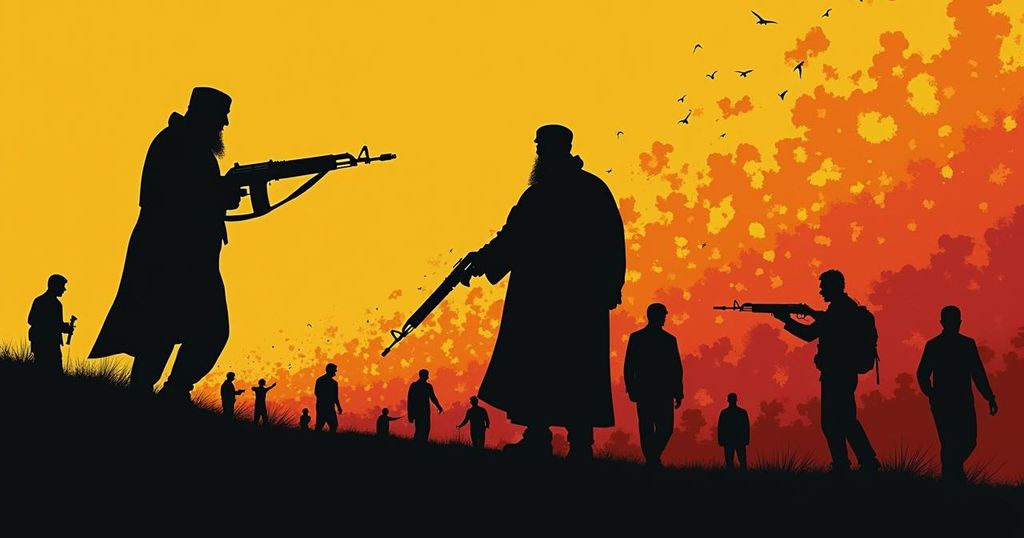Hassan Nasrallah, Leader of Hezbollah, Killed in Israeli Strike
Hassan Nasrallah, the leader of Hezbollah, was killed by an Israeli airstrike in Beirut, marking a pivotal moment for the group and the Middle East. His leadership since 1992 transformed Hezbollah into a powerful paramilitary and political force, known for its confrontations with Israel and involvement in regional conflicts. His death comes amidst escalating hostilities in the region, posing significant challenges for Hezbollah’s future.
Hassan Nasrallah, the longstanding head of Lebanon’s Hezbollah, was killed by an Israeli airstrike, as confirmed by the militant group’s statement. At 64 years of age, Nasrallah had transformed Hezbollah into a formidable paramilitary and political entity within the Middle East, notably leading the organization during the 2006 conflict with Israel and significantly involving them in Syria’s ongoing civil war. His demise resulted from a major airstrike in Haret Hreik, a southern suburb of Beirut, which collapsed several buildings. Hezbollah announced his death, claiming he achieved martyrdom on the path to Jerusalem. Nasrallah’s death occurred amidst a significant escalation in violence between Israel and Hezbollah, in alignment with a broader regional conflict following the recent violence in Gaza. Since his ascension as the leader of Hezbollah in 1992, after the assassination of his predecessor by an Israeli missile, Nasrallah’s reputation grew as he became a potent symbol of resistance against Israel. Although Hezbollah’s activities had typically resulted in tensions with Israel, it was exacerbated in light of recent Israeli airstrikes that led to considerable casualties among Lebanese civilians. Once revered within Hezbollah and the Arab world, Nasrallah spent years operating from hiding due to fear of assassination, delivering messages through satellite links. He is remembered as a charismatic orator, a savvy strategist, and a leader who redefined Hezbollah’s role as both a combatant group and a political organization. His leadership not only invigorated the Lebanese Shiite community but also invoked significant international attention toward Hezbollah’s alignment with Iranian state interests. During his tenure, Nasrallah engaged in various conflicts with Israeli forces, including a notable foray against them during the 2006 war, which resulted in extensive destruction and a high civilian death toll in Lebanon. He positioned Hezbollah against other regional adversaries and played a pivotal role in bolstering the regime of Syrian President Bashar Assad during the Syrian civil war. In his later years, he emphasized the group’s commitment to resisting Israeli actions and defended its intervention in Gaza conflicts through military exchanges along the Lebanese border. Nasrallah’s biography encompasses not only his military endeavors but also his early life where he rose from poverty and connected with Iranian revolutionary ideologies. He hailed from a traditional Shiite background, joining the militant ranks forged during the tumultuous Lebanese civil conflict. His legacy includes Hezbollah’s significant military capabilities and the political infrastructure established within Lebanon, despite enduring criticisms regarding the ramifications of his military initiatives in civilian contexts. His passing signifies a potential shift in the dynamics of resistance against Israel, as Hezbollah’s future leadership confronts the intertwining challenges of domestic politics and regional hostilities. Nasrallah is survived by his wife Fatima Yassin, and several children.
Hassan Nasrallah’s leadership of Hezbollah since 1992 marked a significant period of transformation for the organization, from a local militia formed during the Lebanese civil war to a key player in regional geopolitics, especially concerning the tensions between Iran, Israel, and various Arab factions. Under Nasrallah, Hezbollah established itself not only through military confrontations, notably the 2006 Lebanon War, but also through a social welfare network that underpinned its political legitimacy among Lebanese Shiites and positioned it as a significant force within Lebanon’s complex political landscape. Nasrallah’s alignment with Iranian Shiite ideologies and his charismatic leadership solidified his status within the group and across the Arab world, making his eventual death pivotal in the context of ongoing conflicts and the future of Hezbollah’s political and military actions.
The assassination of Hassan Nasrallah marks a critical turning point in Hezbollah’s history and the broader Middle Eastern power dynamics, reflecting ongoing tensions between Israel and Iranian-backed groups. His legacy as an influential leader who transformed Hezbollah into a formidable political and military entity presents challenges for the group’s future. With his passing, the potential for shifts in resistance strategies against Israel looms, as does the impact on Lebanese and regional stability.
Original Source: apnews.com




Post Comment